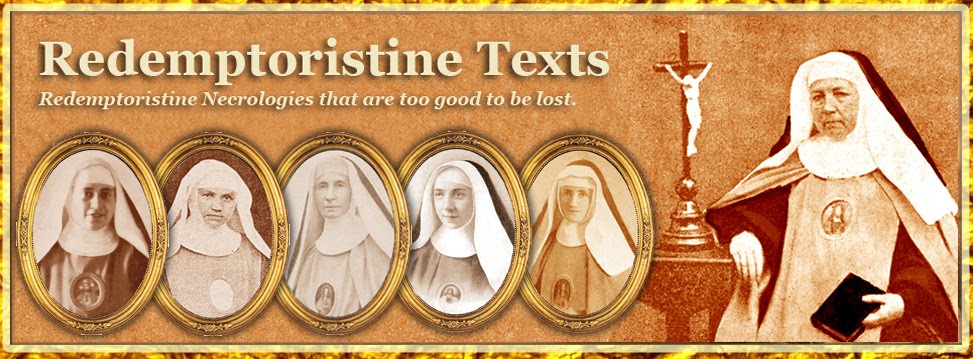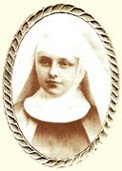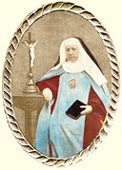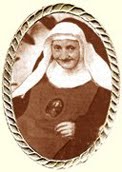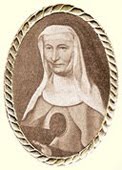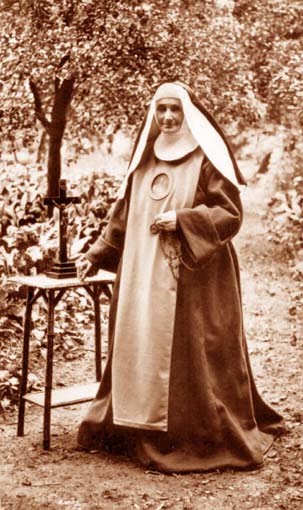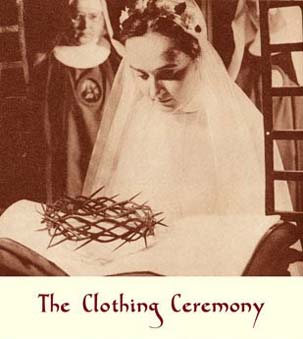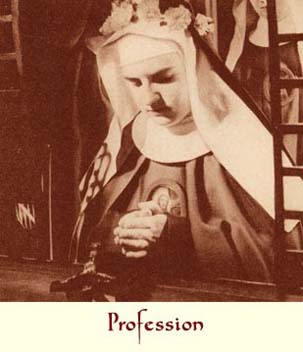This biography is due to the pen of the Rev. Mother Marie-Aloyse of the Immaculate Heart of Mary, whose Life we have just read.
Chapter I. Her childhood.
Her entry into the Monastery.
Chapter I. Her childhood.
Her entry into the Monastery.
This much-beloved Mother, who was truly providential for the community of Bruges, was born in Ath on 29th June 1811, and at her holy baptism she received the names of Rosalia Dieudonné [God-given] Benoîte Joseph. She was the second child of Mr. Joseph Ignatius of Savoy and Mrs. Rosalia Joseph Nève, his wife.
Heaven was lavish with its gifts for this lovely child, who was perfectly endowed on the side of nature, and soon became the object of all the predilections of her dear parents – they neglected nothing to develop the precious seeds she brought with her when she was born through the medium of a first-rate education.
She was scarcely nine years of age when she lost her father, and a great reversal of fortune followed this premature loss. Rosette (this is what they called her at home) already understood the misfortunes of her family; but her great soul and her generous heart were sensitive only to the sorrows of her beloved mother, whom she tried to console, support and sustain by her love and her tenderness, so it was not without much keenly-felt pain that she departed from her to go to Lille to finish her education. In the boarding house in which she was placed, she cultivated all the talents which were to adorn her young person. She became a perfect musician. This talent was always dear to her, because she was able to employ it to the glory of God in chanting His praises, and in playing the organ to accompany the Divine Office.
Her happy character and her good qualities soon made her sought after by a number of parties. Rosette, who did not yet understand God’s designs upon her, decided to accept the hand of a young man who was as pious and good as she was. This marriage was greatly desired by both families; however a secret foreboding told the young lady that it would never happen. In fact, at the moment when the wedding day had just been decided, her fiancé was attacked by a violent fever which carried him off in just a few days. This unexpected death caused her a terrible sorrow and detached her from the world, and when new setbacks assailed her family, she wanted to use her talents in order to console her mother. Madam the Countess of Malet welcomed her with joy to supervise the education of her only daughter. “Come to me”, she wrote, “because you will be a sister and a friend to me, and more the mother of my daughter than her governess.” Rosette soon gained the heart and trust of this virtuous lady, who loved her tenderly. In her home she was able to enjoy all the comforts which could have attached her to a soft and tranquil life, but God soon gave her to feel that He wanted her completely to Himself. Moreover, she had one of those dreams which God sometimes employs to manifest His designs to souls. Saint Philomena appeared to her calling her to her side, and it seemed to her that she was then enjoying all the joys of heaven. After that day, the world inspired in her nothing more than disgust, and she aspired with all her soul to the blessings of the religious life.
But great difficulties lay in the way of her pious design. The tenderness of her mother, who counted on her to console and support her in her old age; her attachment to her family; the affections of the pious Countess, to whom she owed so much gratitude; and finally, her health, which was extremely delicate: all this caused her a great deal of heart-searching, but grace rendered her victorious.
Our holy Institute was being founded in Belgium, and she was one of the first to be admitted into it; but, to conform herself to a desire expressed by the Rev. Mother Marie-Alphonse, she delayed her entry by several months, so as to perfect her talents as an organist. She accepted this sacrifice with a cheerful heart for the good of the community, and finally, on 18th December 1841, she entered the Monastery, provisionally established in the street of Puits-aux-Oies.
The winter was a most rigorous one, and to the cold there was also added everything that poverty could add by way of privations and sufferings in this beginning of the foundation. But nothing daunted her great courage; she had come in order to dedicate herself to a crucified Spouse; and she burned with the desire to follow in His footsteps and share in His sorrows. The Superiors soon became aware of the great treasure that the good Providence had sent them, and they made haste to ask for the necessary dispensations so that she could join the first six postulants and be able to receive the holy habit with them. On 25th February 1842, she took the veil and with it, the name of Sister Marie-Philomena of the Divine Providence. She spent the year of her novitiate with an exemplary fervour, and applied herself to practising the holy Rules with a perfect exactitude. So the day on which she was able to pronounce her vows was a most keenly desired one.
On 23rd March 1843, the first seven novices were to offer their sacrifice with all the joy of their souls, but a most sorrowful event came to sadden this wonderful day. Sister Marie Anne Joseph of the Precious Blood, who had begun her retreat in full health, became so gravely ill that she had to receive the last sacraments on 22nd March, and at the same time she pronounced her vows on her death-bed. Our dear Sister Marie-Philomena, on this occasion, gave proof of her great charity and her devotion by spending the whole time of her retreat at the bedside of her pious companion, who from time to time told her, her eyes moist with tears of gratitude: “Poor Sister, how you devote yourself to me! But when I am in heaven, I will make it up to you by praying for you.” On 23rd March, everyone left the choir chanting the Te Deum which ends the ceremony of profession, and the newly professed went to stand by the bedside of their dying Sister, who looked at them once again as if to bid them a last farewell. The Angelus rang, and the poor soul spoke the words Ecce ancilla Domini [Behold the handmaid of the Lord], then her head tilted gently to one side and she gave up her beautiful soul to God.
This necrology is translated from Fleurs de l'Institut des Rédemptoristines by Mr John R. Bradbury. The copyright of this translation is the property of the Redemptoristine Nuns of Maitland, Australia. The integral version of the translated book will be posted here as the necrologies appear.
